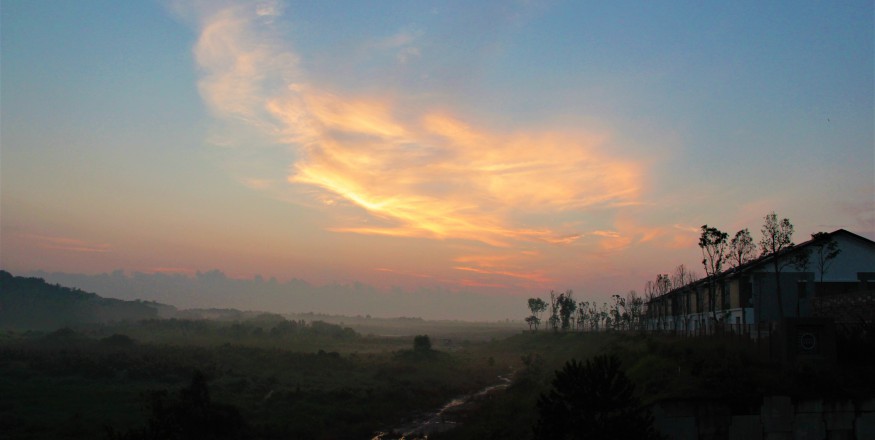“We’ll stay here,”748Please respect copyright.PENANAsM4534bEMz
Judas said, pointing to a tree stump just beyond the bushes dividing the small playground. Children played nearby, their laughter carrying across the breeze. Cay and Judas laid down their backpacks and wrapped their jackets around their waists, settling on the slightly damp, browned grass.
They planned to stay until about an hour before their departure to Venezia—an even farther destination than where Tanya was heading. Cay had so much to tell her, yet he thought it best to say nothing. The future was uncertain, and theirs was a connection already fading with distance. As he pulled his jumper from his bag and spread it out to cover more ground, he found comfort in silence.
They had picked up sandwiches and pitted olives from a nearby Carrefour Express—just enough to sustain them in their worn-out state. The sun poured heat from above, but thankfully, the shade of the cork cedars offered refuge. To Cay, the trees resembled oversized fungi—layered in overlapping greenery, like spores waiting to engulf the entire garden. He always traveled with some form of audio device. Digging into the top compartment of his backpack, he retrieved his Jabra amplifier and turned to Judas.
“Any music preference?”
“Lo-fi hip-hop. Pick something from the ‘Chillhop’ playlist. It’s my favourite.”
“Alright,” Cay nodded, opening Spotify and setting the playlist on shuffle.
The floral scenery combined with the mellow music made for a calming ambiance. Cay made a mental note to thank Judas for his impeccable taste. In recent years, he’d noticed how many younger listeners had turned to low-quality pop or bombastic electronic genres—House, Dubstep, whatever sounded the most excessive. It clashed with what Cay imagined music was meant to be. He often judged people by their playlists, believing musical taste reflected emotional depth.
He began to understand Judas more deeply. There was something in his calmness, his taste in music, and his quiet concern for Cay that moved him. Cay realized he had chosen the right companion.
They leaned against the tree stump, Cay reading his novel while Judas rested with eyes closed. There was no need to conserve energy, Cay thought—he preferred using the free time to fill his mind with something, anything, so that exhaustion would carry him into sleep during the journey to Venice.
Before sundown, they packed their things and left. The empty olive container and sandwich wrappers were tossed into a bin along the way. As they walked away from the familiarity of Villa Borghese—with its mythical beast fountains and towering, healthy cedars—Cay felt a strange sensation. Leaving behind so much, and yet… a relief.
The sad memories would remain in Rome, along with the good ones. When the departure time appeared on the terminal board, they boarded their train.
“Arrivederci, Roma,” Cay whispered to the window as the train pulled away.
Judas returned home changed.
His parents sensed it the moment he stepped through the front door. He wasn’t the same half-estranged son. He was someone different now—someone with a fractured gaze, a weight in his eyes too heavy for words.
His mother moved aside without saying anything. His father, leaning against the kitchen counter with a newspaper, lowered it when he saw his son. Judas looked empty. It was an unusually sunny Sunday morning in Southampton.
He had flown out of Yangon International, carrying memories far darker than what airport security could ever detect. What haunted him most was General Myint, the man who orchestrated the massacre of the Rohingya Muslims. Judas had seen him in the flesh—standing among other men in uniform, all bearing identical badges, all murderers parading under the guise of military order. The newspapers called them regulators. Judas knew better.
He couldn’t forget the boy with the caved-in skull. Nor his mother—slaughtered just feet away. The blood between them had tried to bind them in death, a last embrace denied by gunmetal and boots. If there was an afterlife, perhaps that was where they’d finally reunite.
The Myanmar government had hidden the truth well. Journalists had been detained or blocked. The few who made it to the country left with empty notebooks and quiet fear. Some never made it home.
Strangely, the volunteers were allowed to leave. Judas remembered waiting at the boarding gate—anxious, but not for the reasons others were. No, in his mind, the memory played again and again: the mother, the boy, the blood, the silence.
From Gatwick, he took a national rail service home. An orange-and-yellow ticket was all it took to return to a place that felt both foreign and suffocating. The journey lasted about ninety minutes.
In his room, the smell of worn clothes and old furniture felt alien. Still in his Myanmar clothes, he began collecting everything that no longer belonged: old T-shirts, posters of obscure bands, and childhood clutter he once considered important. Eight black bin bags later, he dragged them out to the government-issued trash bins on the pavement.
Back inside, he returned to his room and sat on his bed. The springs had been misaligned for over a year. He could feel the metal coils twisting beneath the fabric. He hated the bed. But he craved the only comfort left—his own body heat, buried under a thin duvet, hidden away from the brightness of the summer morning.
He didn’t wake until evening, when his mother called him for dinner. He came down without a word. He was starving.
The Sunday roast tasted like nothing.
ns216.73.216.176da2

































